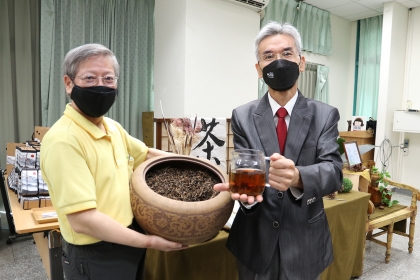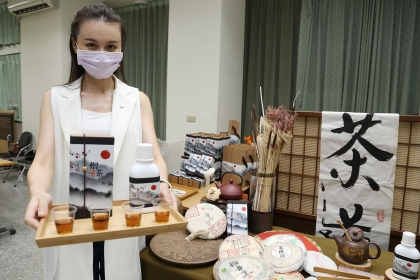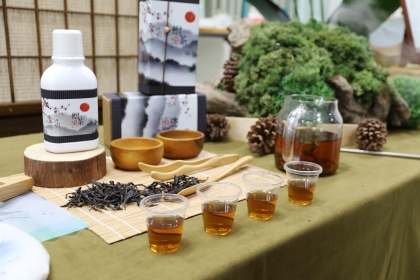Puerh Tea Liquid Preventing Tooth Decay, Teaghrelin Helping Metabolism and Muscle Growth, National Chung Hsing University Develops Two New Tea Products for the First Time in Taiwan
2021-09-08
興新聞張貼者
Unit秘書室
2,184
Science proves that Puerh tea liquid can prevent tooth decay! The National Chung Hsing University team found that compared with oolong tea, Puerh tea has an extra hydrolysable tannin, strictinin, which can inhibit the formation of biofilms and prevent tooth decay. The results will be published in the international journal "Journal of Dental Sciences" in October. National Chung Hsing University further cooperated with the industry to develop a novel commercial product, "Tzen Tea Puerh Mouthwash". On September 8, National Chung Hsing University held a new product launch conference, `featuring Taiwanese domestic tea, and announced two domestically first-time new biotech products: (1) Tzen Tea Puerh Mouthwash and (2) Natural farming Tzen Tea powder.
Professor Jason TC Tzen said that tea liquid is often used to gargle for the prevention of tooth decay. The effect of Puerh tea is generally perceived to be better than that of oolong tea. Puerh tea liquid is similar to oolong tea liquid, which is rich in caffeine and catechins, but it additionally contains a hydrolysable tannin, strictinin. Tooth decay bacteria must first attach and accumulate on the tooth surface to form a biofilm when eroding teeth. The team found that the main mechanism of Puerh tea to prevent tooth decay is to inhibit the formation of biofilm, rather than sterilization. In terms of the effect of inhibiting biofilm, strictinin is superior to catechins, while caffeine having no obvious effect. Studies have confirmed that the effect of Puerh tea is better than that of oolong tea when rinsing the mouth.
Natural farming Tzen Tea powder is made from tea leaves into instant tea powder, which can be brewed and drunk cold or hot. The research team previously found and named teaghrelin in Chin-Shin-Oolong and Sijichun. This ingredient can imitate the human body’s hormonal signaling molecule "ghrelin" that transmits hunger messages, combine with the receptors to trigger hunger and gastrointestinal emptying, and stimulate the secretion of growth hormone and other physiological effects. In recent years, ghrelin has been proven to promote muscle growth and slow down neurodegeneration-related diseases (such as Parkinson's disease and Alzheimer's disease). Based on the reasoning on the effect similar to ghrelin, the research team successfully proved that teaghrelin can also promote the division and growth of muscle cells and slow down the damage of nerve cells induced by drugs. The results were published in the International Journals "Chemico-Biological Interactions" and "Nutrients". It is inferred that teaghrelin has a multi-functional health-preserving and health-care effect, and it is worth being promoted and developed into Taiwan's characteristic biotech health-care products.
The tea-making industry-academy alliance was bonded in two year, the members successfully connected to form an industrial chain. The natural farming Sijichun oolong tea of 1100 tw-catties (660 kg) was used for the first batch of mass production to produce about 150 kg of Tzen Tea extract powder, packaged into 150,000 pieces of portable bags of 1 gram, which were sold out within a week. By the end of October, the preparation of more than 2,000 tw-catties of natural farming roasted Sijichun tea will be completed. Next year, the production is expected to reach 5,000 tw-catties (3 metric tons), opening a new path for Taiwan’s tea industry.
Professor Jason TC Tzen said that tea liquid is often used to gargle for the prevention of tooth decay. The effect of Puerh tea is generally perceived to be better than that of oolong tea. Puerh tea liquid is similar to oolong tea liquid, which is rich in caffeine and catechins, but it additionally contains a hydrolysable tannin, strictinin. Tooth decay bacteria must first attach and accumulate on the tooth surface to form a biofilm when eroding teeth. The team found that the main mechanism of Puerh tea to prevent tooth decay is to inhibit the formation of biofilm, rather than sterilization. In terms of the effect of inhibiting biofilm, strictinin is superior to catechins, while caffeine having no obvious effect. Studies have confirmed that the effect of Puerh tea is better than that of oolong tea when rinsing the mouth.
Natural farming Tzen Tea powder is made from tea leaves into instant tea powder, which can be brewed and drunk cold or hot. The research team previously found and named teaghrelin in Chin-Shin-Oolong and Sijichun. This ingredient can imitate the human body’s hormonal signaling molecule "ghrelin" that transmits hunger messages, combine with the receptors to trigger hunger and gastrointestinal emptying, and stimulate the secretion of growth hormone and other physiological effects. In recent years, ghrelin has been proven to promote muscle growth and slow down neurodegeneration-related diseases (such as Parkinson's disease and Alzheimer's disease). Based on the reasoning on the effect similar to ghrelin, the research team successfully proved that teaghrelin can also promote the division and growth of muscle cells and slow down the damage of nerve cells induced by drugs. The results were published in the International Journals "Chemico-Biological Interactions" and "Nutrients". It is inferred that teaghrelin has a multi-functional health-preserving and health-care effect, and it is worth being promoted and developed into Taiwan's characteristic biotech health-care products.
The tea-making industry-academy alliance was bonded in two year, the members successfully connected to form an industrial chain. The natural farming Sijichun oolong tea of 1100 tw-catties (660 kg) was used for the first batch of mass production to produce about 150 kg of Tzen Tea extract powder, packaged into 150,000 pieces of portable bags of 1 gram, which were sold out within a week. By the end of October, the preparation of more than 2,000 tw-catties of natural farming roasted Sijichun tea will be completed. Next year, the production is expected to reach 5,000 tw-catties (3 metric tons), opening a new path for Taiwan’s tea industry.




